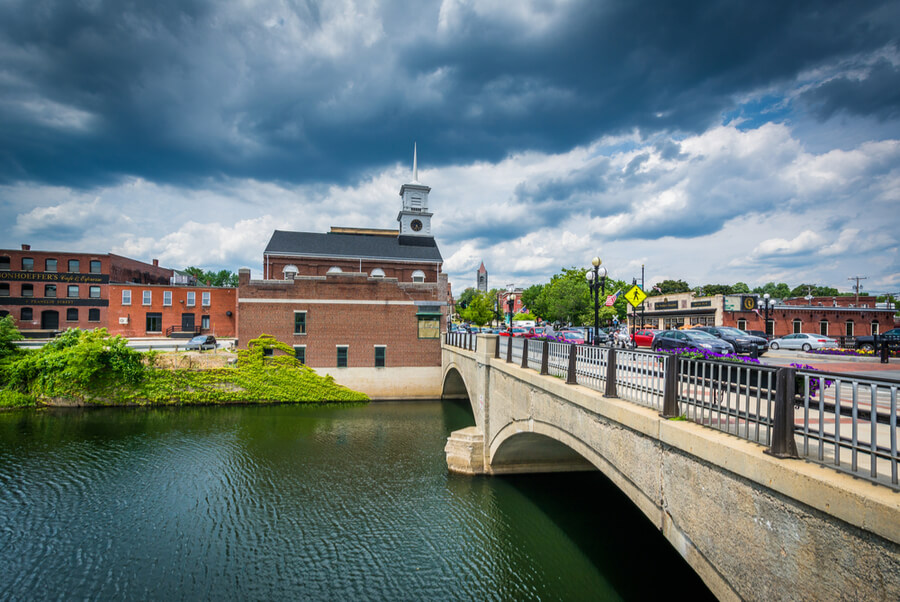Drug Facilities & Alcohol Rehab Centers In New Hampshire

Opioids and other prescription medications make up the majority of the drugs which contribute to drug addiction in New Hampshire. Most often, these addicts seek treatment. Therefore, New Hampshire drug rehab centers have put in place a wide variety of levels of care for patients. Some even offer opioid specific treatment programs to their patients. However, the choice of a drug rehab center in New Hampshire depends on several other factors.
Learn About Substance Abuse Treatment In New Hampshire:
Peculiarity In Substance Abuse In New Hampshire
An estimated 265,000 residents of NH use one or more illegal drugs according to a report by the Substance Abuse and Mental Health Service Administration. This represents an astonishing 19.54% of the entire population of the state. Furthermore, an estimated total of 71,000 residents abuses alcohol in any given year. Consequently, drug addiction in New Hampshire resulted in an estimated 18.61% of the total deaths in the state from 2008 to 2017. This is higher than the national rate. That’s why drug rehab centers in New Hampshire provide a glimmer of hope to patients who are ready and willing to win the battle with addiction.
Drugs Commonly Abused In New Hampshire
According to research on drug-related patient admissions across the state of New Hampshire done by Treatment Episode Data Set (TEDS), substances commonly abused in the state include:
- heroin
- marijuana
- alcohol
- Vicodin
- amphetamines
- cocaine
Peculiarities Of Addiction Treatment In NH Rehabs
New Hampshire drug rehab facilities offer patients specialized medical care for specific addiction cases such as opioids, where the facility has fully dedicated to opioids treatment programs. New Hampshire alcohol rehab centers are also available and provide exclusive medical care to those battling alcohol addiction.
The state also sets aside cash to provide equitable treatment to patients in NH Moreover, the private sector has also equipped drug rehabilitation centers to give patients specialized treatment such as withdrawal management, ambulatory, and residential treatment. The outpatient addiction treatment is aimed at those patients who are busy at work or might have a family to look after and may find it difficult to attend regular rehab sessions.
Specific Types Of Treatments
Addiction treatment viewpoint in NH revolves around offering individualized treatment to patients fighting addiction. The goal of recovery is shared amongst the professionals in the facilities, including therapists, family members, and counselors.
Drug and Alcoholism Recovery Centers In New Hampshire
-

Webster Place, Franklin, New Hampshire
-

The Granite House, Salem, New Hampshire
-

WestBridge, Manchester, New Hampshire
-

Riverbank House, Laconia, New Hampshire
-

Keystone Hall, Nashua, New Hampshire
-

Phoenix House, Dublin, New Hampshire
-

Green Mountain Treatment Center, Effingham, New Hampshire
-

Farnum Center, Manchester, New Hampshire
-

The Plymouth House, Plymouth, New Hampshire
-

The Hampstead Hospital, Hampstead, New Hampshire
Find The Right Rehab In NH
New Hampshire is miserably among the states with a high rate of abuse and addiction. Opioids, which have negative effects on health, are the most abused substances in the state. Unfortunately, the average rates of drug addiction in New Hampshire were found to be higher than the national average.
New Hampshire residents should abstain from substance abuse not only because of the effect it has on health but also on the economy and productivity of the state and country in general. If one is already faced with addiction, seek professional assistance from rehab facilities located throughout the state.
- New Hampshire Opioid Summary. National Institute on Drug Abuse. 2019. https://www.drugabuse.gov/opioid-summaries-by-state/new-hampshire-opioid-summary.
- 2016-2017 NSDUH State-Specific Tables. Substance Abuse and Mental Health Services Administration. https://www.samhsa.gov/data/report/2016-2017-nsduh-state-specific-tables.
- Quick Statistics. Substance Abuse and Mental Health Services Administration. https://wwwdasis.samhsa.gov/webt/newmapv1.htm#.
- Levels of Care in NH. https://www.dhhs.nh.gov/dcbcs/bdas/documents/nh-loc.pdf.

